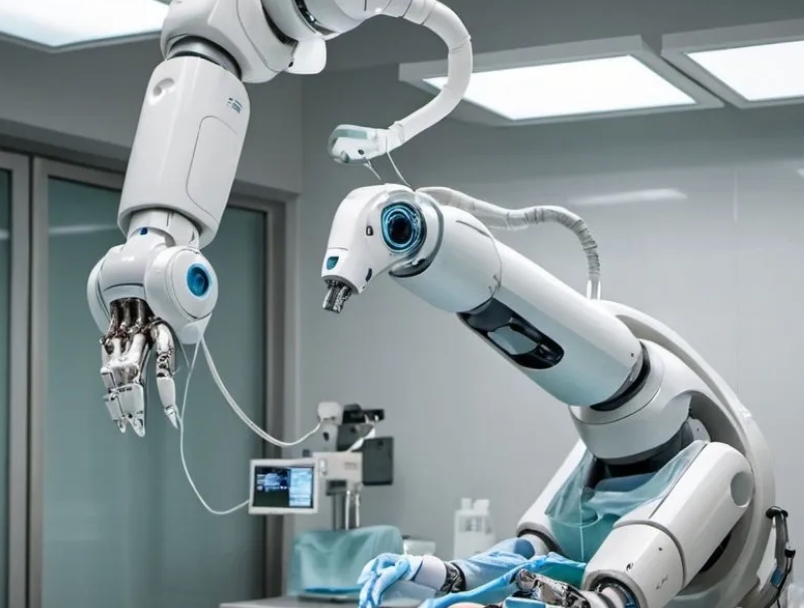Artificial Intelligence (AI) is rapidly transforming the global job market, reshaping industries and redefining the skills required for the workforce of the future. This article examines the multifaceted impact of AI on employment, discussing both the challenges and opportunities it presents.
1. Job Displacement and Automation
AI's ability to automate tasks affects various sectors:
Manufacturing:
- Robotic process automation replacing manual labor
- AI-driven quality control and inventory management
Customer Service:
- Chatbots and virtual assistants handling routine inquiries
- AI-powered voice recognition systems in call centers
Transportation:
- Self-driving vehicles impacting trucking and taxi industries
- AI logistics optimization reducing human intervention
2. Creation of New Job Categories
AI spawns new roles and specializations:
AI Specialists:
- Machine learning engineers
- AI ethics consultants
- Data scientists and analysts
AI-Human Collaboration Experts:
- AI trainers and explainers
- Human-AI interaction designers
AI Maintenance and Oversight:
- AI systems auditors
- Algorithmic bias detectors
3. Skill Set Evolution
AI necessitates new skills across industries:
Technical Skills:
- Programming and coding proficiency
- Data interpretation and analysis
- Understanding of machine learning principles
Soft Skills:
- Creativity and innovation
- Critical thinking and problem-solving
- Emotional intelligence and interpersonal communication
Adaptability and Lifelong Learning:
- Continuous skill updating
- Cross-disciplinary knowledge acquisition
4. Industry-Specific Impacts
AI's influence varies across sectors:
Healthcare:
- AI-assisted diagnostics and treatment planning
- Personalized medicine and drug discovery
Finance:
- Algorithmic trading and fraud detection
- Automated financial advice and risk assessment
Education:
- Personalized learning platforms
- AI-powered tutoring and assessment
5. Workplace Dynamics
AI reshapes how work is performed:
Remote Work Enablement:
- AI-powered collaboration tools
- Virtual reality meetings and training
Productivity Enhancement:
- AI assistants for scheduling and task management
- Predictive analytics for decision-making
Performance Monitoring:
- AI-driven employee performance analysis
- Automated feedback and improvement suggestions
6. Economic Implications
AI's impact extends to broader economic factors:
Productivity Gains:
- Increased output with fewer human hours
- Potential for economic growth and innovation
Income Inequality:
- Risk of widening gap between high-skill and low-skill workers
- Concentration of wealth in AI-driven industries
Gig Economy Growth:
- AI platforms facilitating freelance and contract work
- Shift towards project-based employment
7. Ethical Considerations
AI in the job market raises ethical questions:
Algorithmic Bias:
- Ensuring fairness in AI-driven hiring processes
- Addressing potential discrimination in job matching algorithms
Privacy Concerns:
- Balancing employee monitoring with privacy rights
- Protecting personal data used in AI systems
Accountability:
- Determining responsibility for AI-made decisions in the workplace
- Ensuring transparency in AI-driven management practices
8. Education and Training
Preparing the workforce for an AI-driven future:
Curriculum Updates:
- Integrating AI and data science into educational programs
- Emphasizing interdisciplinary learning
Reskilling and Upskilling:
- Corporate training programs for AI literacy
- Government initiatives for workforce adaptation
Lifelong Learning Platforms:
- AI-powered personalized learning for continuous skill development
- Micro-credentialing for specific AI-related competencies
9. Policy and Regulation
Governmental responses to AI's impact on employment:
Labor Laws:
- Updating regulations to address AI in the workplace
- Protecting worker rights in automated environments
Social Safety Nets:
- Exploring universal basic income concepts
- Developing transition assistance for displaced workers
AI Governance:
- Establishing guidelines for ethical AI use in employment
- Regulating AI's role in hiring and workforce management
10. Future Outlook
Anticipating long-term trends in AI and employment:
Human-AI Symbiosis:
- Increased collaboration between humans and AI systems
- Focus on uniquely human skills complementing AI capabilities
Job Polarization:
- Growth in high-skill and some service-oriented jobs
- Decline in routine cognitive and manual tasks
Global Competition:
- AI proficiency becoming a factor in national economic competitiveness
- Potential for shifts in global labor market dynamics
The impact of AI on job markets is profound and multifaceted. While it poses challenges through automation and job displacement, it also creates new opportunities and drives innovation. The key to navigating this transformation lies in proactive adaptation: individuals must commit to lifelong learning, businesses must invest in responsible AI integration and workforce development, and policymakers must create frameworks that promote innovation while protecting workers' interests.
As we move forward, the focus should be on harnessing AI's potential to augment human capabilities rather than replace them entirely. By fostering a culture of continuous learning and embracing the complementary strengths of humans and AI, we can work towards a future where technological advancement goes hand in hand with widespread economic prosperity and job satisfaction.
american-boffin.com
bfbchamp.com
democraticcoma.com
tigrepelvar.com
charpoles.com
derbywheelblazers.com
fansfocus.net
guildnow.com
hediyeteyze.com
isprimecdn.com
kiira-korpi.net
manutd24.com
mediumtylerhenry.com
mishanghai.org
savethreestrikes.com
smilesbydavis.com
10puntos.net
band-shirt.com
icelandtrails.com
paulmarioday.com
thefunnynanny.com
Dave Tries Ballet
Buon Grande
Criacao Sites
Perry Perkins Books
Writing Essay in AU
Ka Soku
Blood is Blood Movie
Eleanor Writes Things
The Happy Prince Beirut
Town of Witless Bay
Online Igrovoi Club
Trigeminal Neuralgia - Ronald Brisman MD
Chocolate City Burlesque
Advanced Electric Scooters
W Tougei
Breadboard Maniac
Takasu App



